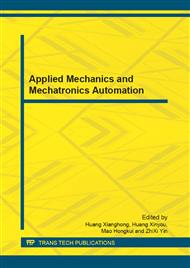[1]
Li Yong-dong, Fan Guo-feng. The Development Present Situation And Prospect Of Chinese Wind Power. Electric Age, 2006(3).
Google Scholar
[2]
Li Shi-zuo, Kang Shi-yu. Chaotic Research Of The Power System Under Periodic Disturbances[J]. GuangXi Univ(Natural Science, 2009, 34(4): 1001-7445.
Google Scholar
[3]
Wang Bao-hua, Yang Chen-wu, Zhang Qiang. Research Summary Of Power System Bifurcation and Chaos[J]. Transactions of China Electrotechnical Society, 2005(7): 1-10.
Google Scholar
[4]
Yang Yu, Zhao Yu-xia. The Discussion Of The Chaotic and Its Application Direction In Power system[J]. Bei Jing, (2007).
Google Scholar
[5]
Huang Run-sheng, Huang Hao. Chaos And Its Applications[M]. WuHan: WuHan University Press, (2007).
Google Scholar
[6]
Liu Bin, Wang Hong-lei. The Summary Of Chaotic Theory Application In Power Systems[J]. Western China Sci-tech, 2009(183).
Google Scholar
[7]
Li Gu-xiong. Modeling Study Of Power Systems Based On Chaos[J]. South China University of Technology Guangzhou automobile academy, 2010(11).
Google Scholar
[8]
Luo Xiao-hua. The Phase Planar Characteristics And Chaotic Oscillation Of Simple Power System[J]. Journal of DongGuan University of Technology, 2008(15): 1.
Google Scholar
[9]
Wang Bao-hua, Zhang Qiang. Power System Oscillation Bifurcation And Its Stability Analysis[J]. Journal of Nanjing Institute Engineering, 2007, 5(2).
Google Scholar
[10]
Application of Chaos Immune Heritage Algorithm In Power System Fault Diagnosis [M]. Electric Power Automation Equipment, 2007(5).
Google Scholar
[11]
Application of Chaos Immune Heritage Algorithm In Power System Fault Diagnosis [M]. Electric Power Automation Equipment, 2007(5).
Google Scholar
[12]
Yang Hong-ying. Application of Short-Term Load Forecasting for Electric Power System Using Chaotic Theory [M]. Relays, 2005(16).
Google Scholar
[13]
Pu Zai-ling, Liu Mei-ju, Wu Xiu-hua. The Chaotic Dynamic Behavior Control Study of Power System[J]. Journal of ShenYang Agricultural, 2009, 40(4): 497-499.
Google Scholar
[14]
Cao Jian-fu, Han Chun-zhao, Fang Yang-wang. Non-linear Theories And Its Application[M]. Publishing House of Xi'an JiaoTong University, 2006: 6-9.
Google Scholar
[15]
Shao Ming-zhu, Luo Shi-yu. Global Bifurcation and Chaotic Behavior of Simple Interconnected Power System [J]. Journal of DongGuan University of Technology, 2009, 16(5).
Google Scholar
[16]
Zai-ling, Zhang Feng, Wu Xiu-hua. The Chaotic Dynamic Behavior Analysis of Nonlinear Power System[J]. Journal of ShenYang Agricultural, 2010, 41(3): 366-368.
Google Scholar
[17]
Sun Yuan-zhang, Jiao Xiao-hong, Shen Tie-long. The Robust Nonlinear Control Of Power System[M]. Tsinghua University Press, 2007: 165-186.
Google Scholar
[18]
Song Yun-zhong, Zhao Guang-zhou, Qi Dong-lian. The Adaptive Compensation Control Of Chaos oscillation In Power System [J]. Proceedings of the EPSA, 2006, 18(4).
Google Scholar
[19]
Liu Li-jun, Li Jie, Cai Jin-ding. Reactive power optimization Based on Strong Guide Particle Swarm And Chaotic Optimization [J]. Electric Power Automation Equipment, 2010, 30(4).
Google Scholar
[20]
S. Grillo, S. Massucco, A. Morini, A. Pitto, F. Silvestro. Bifurcation analysis and Chaos detection in power systems. IEES Laboratory—University of Genova.
DOI: 10.1109/upec.2008.4651499
Google Scholar
[21]
Chen Ye, Gengyin Li Ming Zhou. A combined prediction method of wind farm power. CRIS, 2010, 5.
DOI: 10.1109/cris.2010.5617532
Google Scholar
[22]
Zhen Li Siu-Chung Wong Tse, C.K. Forced Oscillations in Wind Energy Generation Systems. Chaos—Fractals Theories and Applications, (2009).
DOI: 10.1109/iwcfta.2009.28
Google Scholar
[23]
Hua Xue Yufei Wang. Fuzzy optimal control of doubly fed induction wind power generator systems. MACE, 2010(3512).
DOI: 10.1109/mace.2010.5536699
Google Scholar
[24]
Dong Lei, Wang Lijie, Hu Shi, Gao Shuang, Liao Xiaozhong. Prediction of Wind Power Generation based on Chaotic Phase Space Reconstruction Models. Power Electronics and Drive systems, 2007(744).
DOI: 10.1109/peds.2007.4487786
Google Scholar


